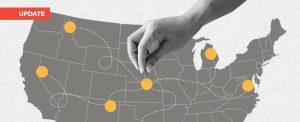David Benton’s career path in the regulatory field has been anything but typical. The current CEO of the National Council of State Boards of Nursing (NCSBN) has worked in high-level government positions around the world, making efforts to move the health care professions forward since the early 1980s. In the first of our three-part Q&A series, Benton sits down with Ascend Magazine Editor Paul Leavoy to discuss his professional career as well as the core principles that guide the world of health regulation at large.
Can you tell us why you got into nursing in the first place and what that journey has looked like since then?
I didn’t ever imagine I’d be in this job or, indeed, have the opportunities I’ve had over the years. The reason I ended up pursuing a regulatory path was really pure career advice at school. My teachers told me that I was good at math and good at science, so I should become an engineer, so I went off and did a degree in engineering. Enjoyed the social life, hated engineering, but kept passing all the exams.
At the end of that time, my father had multiple sclerosis, and he wasn’t well, so I didn’t really want to go too far from home. As is the case with many people who have multiple sclerosis, he had a progressive decline, and I spent quite a bit of time in hospitals. As a result of that, I saw what nurses were doing, and that’s how I ended up applying to do nurse education.
Having gotten a degree in engineering, I was a somewhat different student. I didn’t find the nurse education very challenging, and I decided I wanted to do a research degree at the same time. I was told by the school that this wasn’t allowed by the regulator, and I said, “well, who are these regulators?” I started to get an understanding of the power of the regulator, both in terms of the individual and in terms of shaping how practice is delivered, at the very early stage.
I managed to negotiate with the university that I could retrospectively register for my MPhil degree once I had finished my nursing program. I was doing this piece of work on computer-assisted learning, back in the 80s, when computers were almost steam-driven. That resulted in the national board for Scotland (which, at one point, I then became the chief executive of) inviting me to be on an advisory group on the use of technology in continuing education.
So, I was engaged, as a newly minted staff nurse, at the highest levels of regulation in Scotland. The rest of it has been a series of career opportunities where I have recognized the centrality of the regulator’s role in moving forward services, whether that be in a research phase, when I went out to the south of England, or when I was a commissioner of health services in London… [These were] ways of increasing access to services and the quality of those services as well.
From there, I became a government nurse, working with colleagues in Whitehall and in the northern Yorkshire region, where I was the regional nurse director. In that move, I took on the responsibility of transitioning the nursing programs from the former hospital-based colleges into the university sector. Again, that gave me another different perspective on this.
I went back up to Scotland to become the chief executive of the national board, getting much more heavily involved with legislation and the redesign of the U.K. system. I was a central player in the bringing together of the four national boards and [what was then] the United Kingdom Central Council (UKCC) into what is now the Nursing and Midwifery Council (NMC).
I realized the one job I hadn’t had was as a director of nursing. I felt that was an important leadership role in terms of actually moving forward services. I went back up to Aberdeen, where I was appointed the director of the university teaching hospital, and then I was headhunted to go off to Geneva, to the International Council of Nurses (ICN) where I headed up their work on regulation, licensing, and education for three years. After that, I became the chief executive [of the board] for seven years, for a total of 10 years there. Came over to the U.S., and here I am!
It was 2015 when you left the ICN and joined with the NCSBN. How did that come about?
The post was drawn to my attention, let’s put it like that. The thing that was exciting about it was that I’d moved in ICN from a role where I was exclusively focused on the regulatory education and licensure piece to a role which was much broader, where I had responsibility in relation to socioeconomic welfare and the advancement of the profession [in addition to] the regulatory piece. The opportunity to come to NCSBN, where I could focus exclusively on regulation, was really what attracted me to the role. I came over, was interviewed, and the rest is history. I’m coming up on my eighth year here.
How can you communicate the value of regulators to new entrants, licensees, and the public at large?
There are a few points I would make. The first one is that regulation charts the direction of the profession. So quite often, when you ask regulators, “what is it you do?” and [the answer is] “we protect the public,” it’s much more than that. Good regulation actually saves lives.
When you and I are in our most vulnerable time, and we are maybe unconscious and unable to care for ourselves or look after our interests, the fact that the regulator has set a series of standards – which means that the people you are interacting with have a set of values, have the expertise necessary, and will do the right thing – means that regulation literally saves lives.
I think it’s important to understand the real power of regulation and the real potential of regulation to help drive policy change to meet the changing needs of society. It’s not a bureaucratic, back-office job. It’s very much about looking at how we can shape the profession to provide the access to quality services that are needed as healthcare needs change in society.
Speaking of healthcare needs changing in society, you started general nursing in the early 80s and now it’s 2022. How is nursing the same and how is it different from how it was when you entered?
Nursing is still very much a hands-on profession. It’s there with people at their most vulnerable times and is there to make the difference in terms of their path to recovery or to a peaceful death. The essence of the profession remains very much the same. We’re certainly seeing greater specialization as technology has advanced and has enabled us to do far more things than we could 40 years ago.
It’s also changing in that there’s a recognition of the central role of different members of the healthcare team. We all have a contribution to make, and that contribution is very much based on the expertise that we bring to bear. It’s not about one discipline kind of taking the lead all the time. It’s almost like an orchestra, where there are different components of the orchestra, and they all have a role to play.
When they come together, you get this beautiful music, which in the healthcare sense means that the experience of the patient is completely holistic — that there’s a consistency of approach and a synergy which means that the optimum outcomes can be achieved. I think we’re certainly seeing far more of an interdisciplinary respect and contribution, which is different.
The use of evidence is very much something that has [come into play] over time… Historically, I remember my tutors bringing out these notes, which they probably had been using for 20 years, and they would just stand in front of the class and give you whatever it was. Self-directed learning [is about] equipping the individual to be able to learn the material they need as the demands of services change, so you’re teaching people to learn rather than teaching them content.
And, of course, there’s research. I ended up getting my MPhil and used research in my practice at the very early stage, and then subsequently came back and did a Ph.D. looking at regulation. So, the use of research, the generation of knowledge, is something that nurses have really embraced over the last four decades.
How did you hope your MPhil would augment your work in healthcare?
I had an early interest in the use of computers, and I could envision the use of computers providing education to the nurse as they needed it. My MPhil research looked at the application of computer-assisted learning to post-basic nurse education in the mental health space, because I did a mental health training, and I worked in an old-style mental hospital where accessing education was actually quite challenging and difficult.
[I was researching how] we could use technology to provide 24/7 education, so I did this study – a randomized, controlled trial – where I was looking at whether it could work and whether it actually had an impact. And that’s how I kind of got started in that whole space. From there, I was picked up by the national board to serve on their strategic advisory group, looking at that whole area of distance learning and technology, and the use of more flexible delivery models.
Speaking of distance learning, you relocated to Madrid for your Ph.D., correct?
The Complutense University of Madrid, which is one of the ancient universities, has a history of looking at regulatory issues. The head of the medical school and dean of research there had done a lot of work in that space, as had the head of the nursing school. I was aware of the work that they were doing, and as a result, I wanted to do something that was going to push the envelope.
I had already had a research training. I had already published, at that stage, probably about 100 papers. So it wasn’t really a research training I was looking at – I wanted to add new knowledge that could be used. That’s why I went there, where I had a number of mentors who really drove me forward. By the end of the Ph.D., I had published another eight papers.
At that stage, I was looking at the international comparative analysis of how regulation works around the world. I was looking at, in terms of a legal tradition, common law frameworks (such as in Canada, U.K., and the U.S.), civil law frameworks (such as in some European countries), and Islamic law, working with colleagues in the middle east. Those different perspectives really gave me a depth of knowledge that I welcomed, and I’ve been using it ever since.
What central theme has guided your sense of purpose throughout your entire career in all these different roles?
The central theme has always been around making a difference. How can you improve the current situation? One of the things I realized early on is that nursing is very focused on making sure [it improves] the experience of a patient. If you want solutions, you ask a nurse. They know what the problems are. They often have very few resources available to them, so they’ve got to be creative.
As I’ve moved through my career, I have worked closely with a huge number of nurses who have come up with solutions that have made an enormous difference to the lived experience of either the people they’re caring for or the folks they’re managing or the folks they’re teaching. So it’s very much about making a difference. That’s what’s driven me.
Check out part 2 of our Q&A series with David Benton on the ideas and mechanics behind health care regulation systems here. Want to learn more about public health policy? Listen to our latest Ascend Radio podcast with Dr. Marie Bismark on patient safety and the COVID-19 pandemic, or check out our piece on the history and future of the U.S.’s Nurse Licensure Compact (NLC).
MORE INSIGHT

‘The people piece’: The key role of people in regulatory transformation
Regulatory transformation is not only about changing an organization’s technology and processes; it is also about empowering and engaging its people throughout the journey. In this article, Rick Borges looks at the key role that people play as enablers of regulatory transformation.

Playing in the sandbox: Old regulators are learning new tricks
Regulators are increasingly turning to an innovative policy tool called a “sandbox” to address various challenges. In this article, Contributor Will Morrison explores the origins of regulatory sandboxes and how they work.

Regulators tackle operational resilience in the UK
To mitigate the risk of major operational failures affecting the day-to-day lives of millions of financial services customers, U.K. regulators issued new rules on operational resilience that came into force in March 2022. In this article, Rick Borges looks at the requirements and the impact they will have on firms’ cyber resilience and use of third-party providers.

An exhaustive breakdown of interstate compacts in the U.S.
Just how many interstate licensing agreements are active in the U.S.? And in which professions are regulators looking to further promote license mobility? In our latest Ascend article, we take an in-depth look at the country’s largest active and pending multistate licensing agreements.

How the U.K.’s new Consumer Duty will change how firms operate
On July 31, the U.K.’s Financial Conduct Authority (FCA) will begin enforcing a new Consumer Duty that will set higher and clearer standards of consumer protection across financial services and require firms to put their customers’ needs first. In this article, Ascend Contributor Rick Borges explores the impact this change will have on how firms operate.

Cayton asks ChatGPT: Is AI a good thing or a bad thing?
Is AI a good thing or a bad thing? It’s a question that’s currently top of mind for lawmakers and citizens alike as the development of increasingly powerful AI technologies continues at a rapid pace. As Harry Cayton recently contemplated this question, he decided to ask ChatGPT to see what it had to say.








